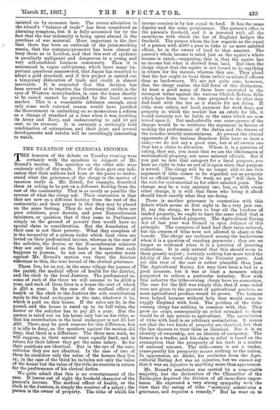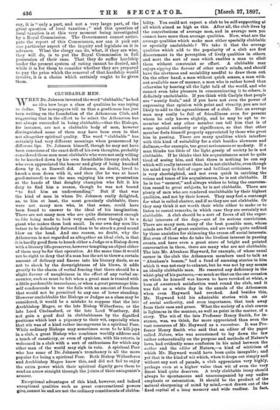THE TAXATION OF CLERICAL INCOMES. T HE honours of the debate
on Tuesday evening were certainly with the speakers in support of Mr. Round's motion. The speeches on the other side were curiously wide of the mark. Few of them gave any indi- cation that their authors had been at the pains to under- stand what the grievance of the clergy in the matter of taxation really is. Mr. Birrell, for example, described them as asking to be put on a different footing from the rest of the community. That is as nearly as possible the reverse of what the clergy ask. Their contention is that they are now on a different footing from the rest of the community, and their prayer is that they may be placed on the same footing. They do not deny that there are poor solicitors, poor doctors, and poor Nonconformist ministers, or question that if they came to Parliament Simply on the ground of poverty they would have no special claim to consideration. But the foundation of their case is not their poverty. What they complain of is the inequality of a system under which local rates are levied on their professional income, whereas in the case of the solicitor, the doctor, or the Nonconformist minister they are only levied on the lands or houses that each happens to possess. In not one of the speeches made againet Mr. Round's motion was there the faintest reference to this, the true kernel of the clerical grievance.
There live, let us say, in the same village the parson of the parish, the medical officer of health for the district, and the clerk to the local Justices. The professional in- come of each of the three we will assume to be £500 a year, and each of them lives in a house the rent of which is £50 a year. In the case of the medical officer of .health or the clerk to the Justices the sole contribution made to the local exchequer is the rate, whatever it be, which is paid on this house. If the rates are 2s. in the pound, and the house is rated up to its full value, the doctor or the solicitor has to pay .25 a year. But the parson is rated not on his house only but on his tithe, so that his contribution to the local exchequer is not £5 but £50. There.may be good reasons for this diffel.ence, but it is idle tedeny, as the speakers against the motion did -deny, that there is a difference. The three men work, we will suppose, in their several ways equally hard, and in return for their labour they get the same salary. So far their positions are identical. But in the eye of the rate- collecter they are not identical. Iii the case of two of them he coniiders only the value of the houses they live in; in the case of the third he includes not only the value of the house' but the value of thti tithe he receives in return for the perfdrmance of his clerical duties.
We quite admit that this is an overstatement of the case. It leaves out of sight the freehold character of the parson's income. The medical officer of health, or the clerk to the Justices, is simply the receiver of a salary; the parson is the owner of property. The tithe of which his income consists is by law equal to land. It has the same dignity and the same permanence. The parson's office is the parson's freehold, and it is invested with all the sacredness with which the law of England hedges the freehold. The person whom the law regards as the equal of a parson with £500 a year in tithe is no mere salaried officer, he is the owner of land to that amount. The parson's whole income is rated just as the squire's whole income is rated,—supposing, that is, that the squire has no income but what is derived from land. But then the clergy object that the squire is not bound to do anything in return for his income, whereas they are. They plead that the law ought to treat them rather as salaried officers than as landowners. We are not quite sure, however, that the clergy realise the full force of this distinction. At least a good many of them have protested in the strongest terms against the various Church Reform Bills which have from time to time proposed to do what they find fault with the law as it stands for not doing. If tithe were salary, not land, payment for work done, not property in which the worker has an estate for life, it would certainly not be liable to the rates which are now levied upon it. But undoubtedly one consequence of the change would be to reinforce the argument in favour of making the performance of the duties and the tenure of the benefice strictly conterminous. At present the clerical opponents of the various Benefices Bills have at least a case,—we do not say a good case, but at all events one that has a claim to attention. Where it is a question of rating, they say, you insist that we are the life-tenants of ecclesiastical property, not mere salaried officials. But if you put us into that category for a fiscal purpose, you have no right to take us out of it again when that purpose is served. The clergy will be no longer able to use thia argument if tithe comes to be regarded not as property but as official income. "No work, no pay" will then be the rule for ecclesiastical as for other salaried posts. The change may be a very salutary one, .but, as with every other change, it is well that those who bring it about should know, exactly what they are doing.
There is another grievance in connection with this debate which seems at first sight to be a very just one. If, say the clergy, we have to bear all the burdens of landed property, we ought to have the same relief that is given to other landed property. The Agricultural Rating Act of last year was framed in open defiance of this principle. The occupiers of land had their rates reduced, but the owners of tithe were not allowed to share in the benefit. The clergy are reckoned among the landowners when it is a question of exacting payments ; they are no longer so reckoned when it is a question of granting reductions. It is only natural that this should seem to them grossly unjust ; certainly nothing has more tried the fidelity of the rural clergy to the Unionist party. And yet this view of the case is rather plausible than just. The Agricultural Rating Act may have been a had or a good measure, but it was at least a measure which purported to relieve a particular industry. Now with this industry the tithe-owning clergy have no connection. The case for the Bill was simply this, that if some relief were not given to the growers of agricultural produce, no more agricultural produce would be grown. The farmers were helped because without help they would cease to supply England with food. The position of the tithe- owning clergy has nothing in common with this. They grow no crops, consequently no relief extended to them would be of any service to agriculture. The assimilation of tithe with land is an arbitrary assimilation. It means- not that the two kinds of property are identical, but that the law chooses to treat them as identical. But it is au identity of ownership, not an identity of occupancy. The farmer is a trader, and his claim to relief is based on the assumption that the prosperity of his trade is a matter of national concern. The tithe-owner is not a trader, consequently his prosperity means nothing to the nation. In appearance, no doubt, his exclusion from the Agri- cultural Rating Act was an injustice, but we cannot say that it was an injustice in anything more than appearance.
Mr. Round's resolution was carried by a respectable majority, but the declaration of the Chancellor of the Exchequer deprived the division of all immediate impor- tance. He expressed a very strong sympathy with the view that the rating of tithe "certainly constitutes grievance, and requires a remedy." But he went on to
say, it is "only a part, and not a very large part, of the great question of local taxation ; " and this question of local taxation is at this very moment being investigated by a Royal Commission. The Government cannot antici- pate the report of this Commission, nor can it pick out one particular aspect of the inquiry and legislate on it in advance. What the clergy can do, what, if they are wise, they will do, is to put the Royal Commission in full possession of their case. That they do suffer hardship under the present system of rating cannot be denied, and while it is for them to consider whether they are prepared to pay the price which the removal of that hardship would involve, it is a choice which certainly ought to be given them.







































 Previous page
Previous page